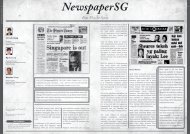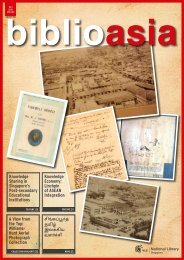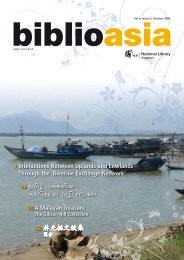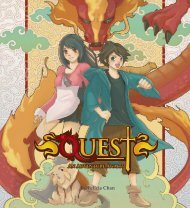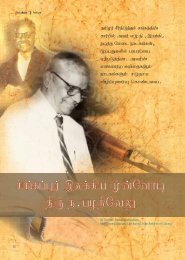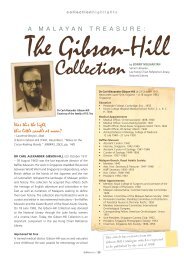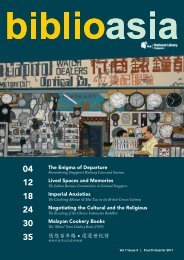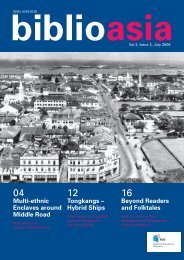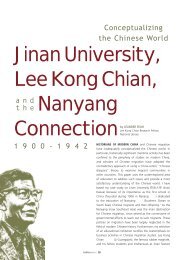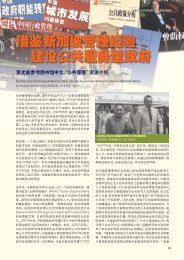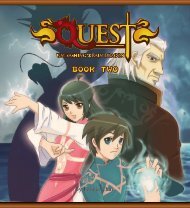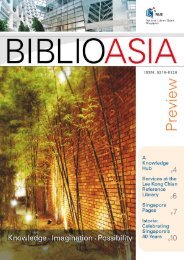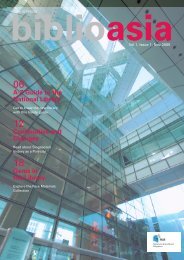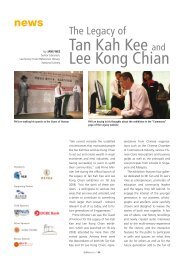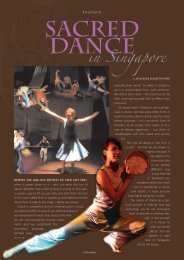Vol 7 Issue 4 | March 2012 - National Library Singapore
Vol 7 Issue 4 | March 2012 - National Library Singapore
Vol 7 Issue 4 | March 2012 - National Library Singapore
You also want an ePaper? Increase the reach of your titles
YUMPU automatically turns print PDFs into web optimized ePapers that Google loves.
04<br />
05<br />
SPOTLIGHT<br />
A<br />
The Yeo Brothers, from left: Teck Hock, Teck Kee, Teck Joon and Teck Chye.<br />
B<br />
My parents’ marriage certificates, in Chinese, with signatures in English.<br />
A<br />
Tell it<br />
Routes and Roots<br />
First, let me explain the title I have chosen for my memoir, Routes.<br />
I am told the American pronunciation is “routs” but obviously that<br />
Doing It Differently<br />
Because an autobiography traditionally starts with the author<br />
reminiscing about his/her life starting from birth, the first<br />
‘Slanted’<br />
is not what I have in mind. I wanted a pun that suggests “roots”,<br />
a reference first of all to Alex Haley’s 1976 groundbreaking book<br />
Roots: The Saga of an American Family. 1 In that book, Haley<br />
constraint is the adherence to sequence; he/she must observe<br />
chronology in the storytelling. He/she is acutely aware that he/<br />
she is writing about the past in “recall” mode. This is a challenge<br />
goes back to his family’s early roots in Africa and discusses how<br />
as we all know that we have selective memories.<br />
An Approach to<br />
Writing my Memoir<br />
the first ancestor was transported to America to work as a slave.<br />
The book focused on “roots” to mean “origins”, reinforced greatly<br />
by the television series that followed the publication of the book.<br />
Yes, I am interested in my roots, in that sense, and it shows in my<br />
Following a chronological method may be a less-than-exciting<br />
necessity but it enables me to grasp time. I do acknowledge that<br />
I live in the present as much as I do in the past. Quite often, they<br />
accounts of the lives of my parents and grandparents.<br />
are in fluid fusion or collision. So, as art organises the chaos of<br />
my life, I have tried to artfully organise my memoir in the form<br />
Robert Yeo<br />
Poet and Playwright<br />
In my view, one cannot write a good memoir without<br />
reading other people’s memoirs and learning from<br />
them. Though I am aware of what Gore Vidal said<br />
about the difference between an autobiography and a<br />
memoir, I am going to assume in this essay that they<br />
are the same; i.e. a person writes about his personal life<br />
and at the same time involves himself as a witness to<br />
public events he/she is influenced by or had influence<br />
over. The significance of reading what others have<br />
written, then, is to see if I can do it differently.<br />
At the same time, I am keen to use the title Routes to refer to<br />
the physical journeys that my grandparents made. My reading of<br />
history tells me that the ancestors of the Chinese in Southeast<br />
Asian countries came mostly from South China, namely the<br />
provinces of Fujian, Guangdong and Guangzhou.<br />
Whether the migrants came overland or by sea, some had to<br />
choose their routes while others had their routes chosen for<br />
them. From villages and ports in China in the 19th and early part<br />
of the 20th centuries, they left for Southeast Asia: Vietnam, Laos,<br />
Burma, Thailand, Malaya, <strong>Singapore</strong>, Indonesia, Borneo and the<br />
Philippines. In the case of my paternal grandparents, their route<br />
took them from South China to Sarawak and then to <strong>Singapore</strong>.<br />
of a ripple. Herein lies the difference between my memoir and<br />
most of the rest: While being linear, I can, at the same time, be<br />
circular. Whilst interrogating the past, I am still able to confront<br />
the present.<br />
The Ripple Effect<br />
At the core of my book is the Self; the conscious Self. I start<br />
with my experience, my earliest memory and then “ripple out” to<br />
explore how the Self is shaped by events in my community, my<br />
country and the rest of the world. I am able to do this because of<br />
the life I had lived up to 1975. Born in <strong>Singapore</strong> in January 1940<br />
The question is, “How differently”<br />
For my maternal grandparents, they left South China for Malacca<br />
and then eventually settled in <strong>Singapore</strong>.<br />
My grandparents’ journeys suggest a third meaning to “routes”:<br />
“Choice”. Did the migrant have a choice as to where he/she would<br />
go after leaving South China Going southeast would have brought<br />
them anywhere, to Vietnam, Thailand, Malaya or <strong>Singapore</strong>, and<br />
so on. Was he/she pushed by domestic factors like poverty or war<br />
Or did the allure of a new life outside China beckon<br />
This page<br />
Routes: A <strong>Singapore</strong>an Memoir 1940-75 by Robert Yeo. All<br />
rights reserved. Ethos Books, c2011.<br />
B



